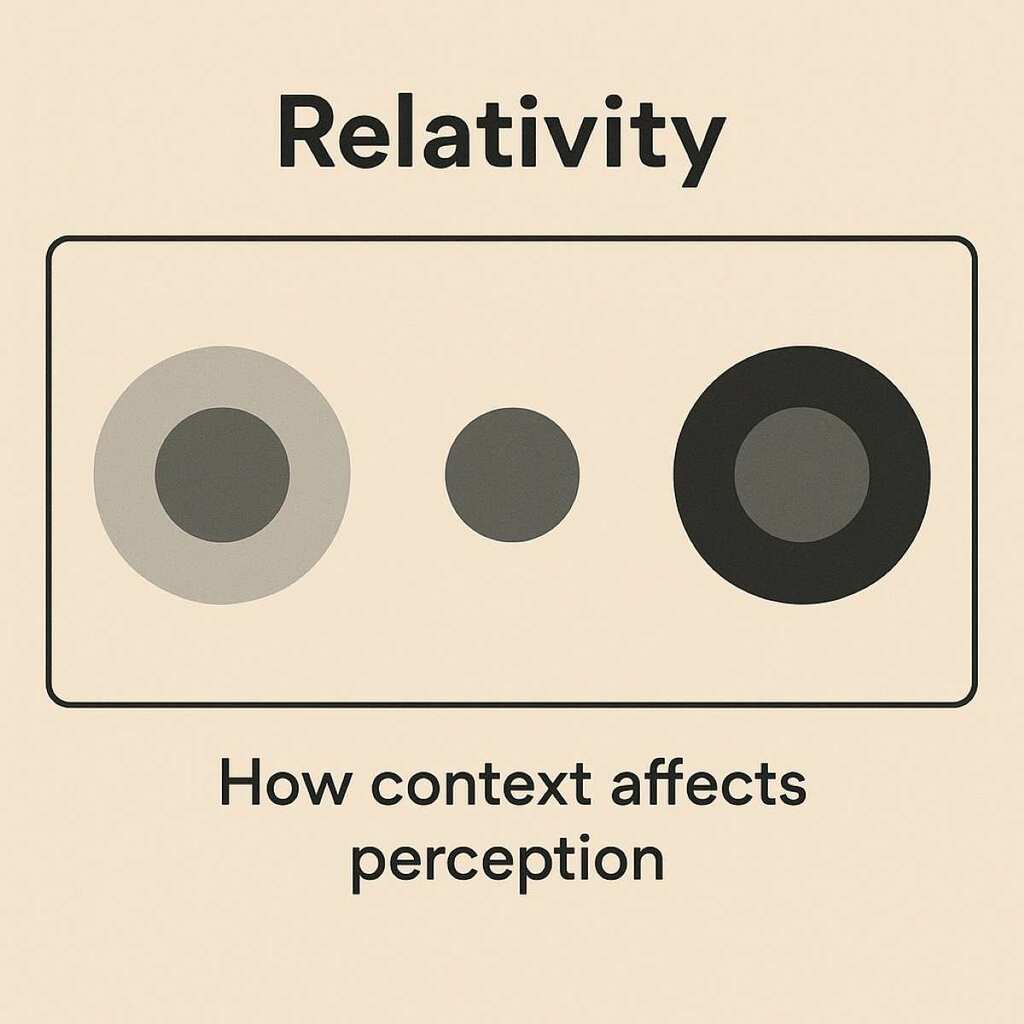In this article, you’ll learn how the relativity mental model affects your thinking in business, finances, and relationships. We’ll look at how marketers, negotiators, and your past experiences shape what feels “reasonable.”
You’ll also learn how to outsmart these traps and make better decisions.
What Is the Relativity Mental Model?
The relativity mental model demonstrates how our perception changes based on surrounding context
The relativity mental model, inspired by Einstein’s theory of relativity in physics, explains how we perceive and evaluate things not in absolute terms but in relation to something else. In Einstein’s theory, measurements like time and space aren’t fixed—they depend on the observer’s frame of reference. Similarly, in decision-making, our judgments aren’t absolute but relative to the comparisons we make.
This mental model reveals a fundamental truth: humans don’t possess an innate ability to measure absolute value. Instead, we excel at comparing differences. We evaluate options not by their intrinsic worth but by how they stack up against alternatives or reference points.
“Everything is relative, and only that is absolute.” — Auguste Comte
Understanding relativity helps explain why the same salary can feel generous or insufficient depending on what your colleagues earn, or why a house might seem affordable after viewing several more expensive properties. Our brain constantly seeks reference points to establish value.
Core Principles of the Relativity Mental Model
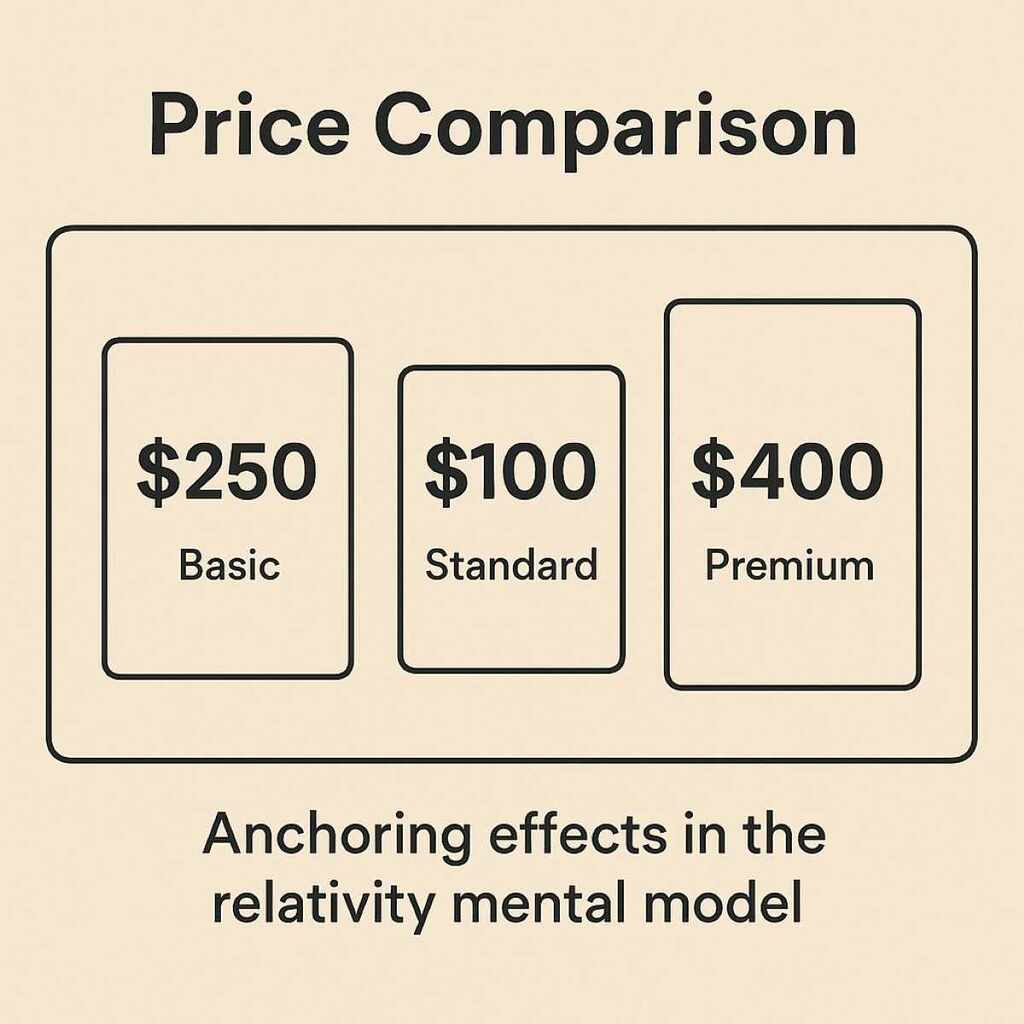
How anchoring affects our perception of value through the relativity lens
Comparative Thinking
The foundation of relativity is our brain’s preference for comparative rather than absolute evaluation. We struggle to determine if $50 for a shirt is objectively “good” without comparing it to other shirts. This comparative nature means our decisions are heavily influenced by the available options and how they’re presented.
Anchoring Effect
Anchoring is when an initial piece of information disproportionately influences subsequent judgments. For example, if you first see a $1,000 watch, a $400 watch suddenly seems “reasonable” by comparison—even if $400 exceeds your original budget. Retailers leverage this principle by placing premium products next to standard offerings.
Contrast Principle
The contrast principle states that we perceive greater differences when items are presented sequentially rather than simultaneously. Real estate agents often show less attractive properties before showcasing their primary listing, making it appear significantly more appealing through contrast.
Frame of Reference
Your personal experiences create a unique frame of reference that influences how you evaluate new information. Someone who grew up with financial hardship might view a $50,000 salary very differently than someone raised in affluence. These frames of reference act as invisible lenses through which we interpret the world.
Real-World Applications of the Relativity Mental Model

Pricing strategies often leverage the relativity mental model to influence consumer choices
Relativity Mental Model in Business and Pricing Strategy
Companies masterfully apply the relativity mental model in their pricing structures. The “decoy effect” is a classic example—adding a third, less attractive option to make one of the original choices seem more appealing. Subscription services often present three tiers: basic, standard, and premium. The premium option may exist primarily to make the standard option appear more reasonable.
Example: A streaming service offers three plans: $8.99 (basic), $13.99 (standard), and $19.99 (premium). The premium plan acts as an anchor, making the standard plan feel like the “sensible choice” even though the basic plan might meet most users’ needs.
Personal Finance Decisions
Relativity significantly impacts our financial choices. When purchasing a car, spending an extra $500 on upgrades seems trivial relative to the $30,000 base price—though you might deliberate extensively over a standalone $500 purchase. This “relative thinking” can lead to overspending when dealing with large transactions.
Similarly, home buyers often exceed their initial budget after viewing properties above their price range, as their perception of “reasonable” shifts upward through exposure to more expensive options.
Relationship Satisfaction
The relativity mental model extends to our personal relationships. Satisfaction often depends less on absolute qualities and more on how our relationship compares to others or to our expectations. Someone might feel dissatisfied with a supportive partner if surrounded by friends with seemingly “perfect” relationships, while the same relationship might feel exceptional if their reference point involves less healthy dynamics.
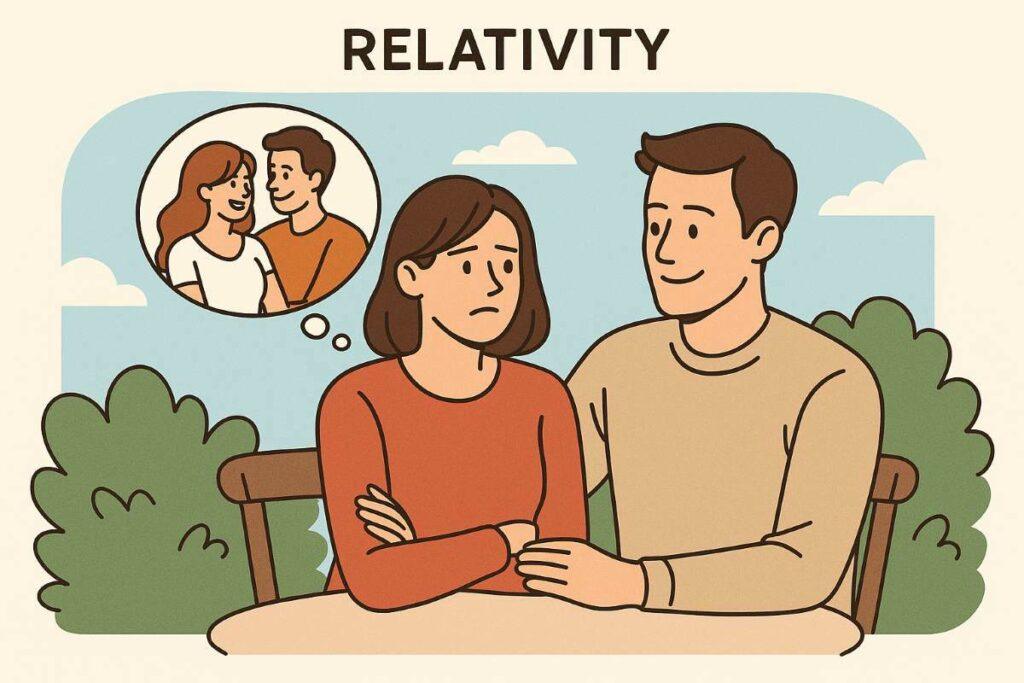
How social comparison influences relationship satisfaction through the relativity lens
Cognitive Biases Connected to the Relativity Mental Model
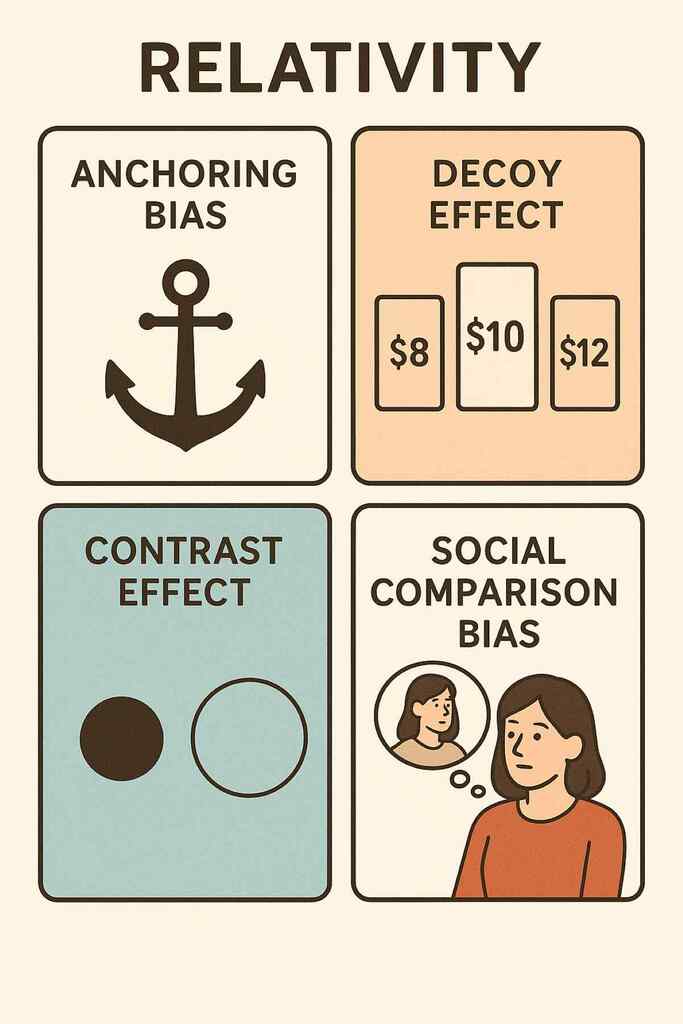
Common cognitive biases that stem from our relative thinking patterns
Anchoring Bias
Anchoring bias occurs when we rely too heavily on the first piece of information encountered. In salary negotiations, the initial offer serves as an anchor that influences the entire discussion. If an employer opens with $70,000, negotiations will likely center around that figure, even if market value is higher.
Decoy Effect
The decoy effect (or “asymmetric dominance”) is when a third, less attractive option makes one of the original options seem better. This is why restaurants include very expensive wines—not necessarily to sell them, but to make moderately expensive options appear reasonable by comparison.
Contrast Effect
The contrast effect causes us to perceive things differently when presented alongside something else. Dipping your hand in cold water will make room-temperature water feel warm, though objectively it isn’t. Similarly, a $200 price reduction seems more significant on a $500 item (40% off) than on a $2,000 item (10% off), though the absolute saving is identical.
Social Comparison Bias
We naturally evaluate ourselves relative to others rather than against objective standards. This can lead to the “hedonic treadmill”—where increased wealth or status provides only temporary happiness as we quickly adapt and begin comparing ourselves to a new reference group.
Upward Comparison
Comparing yourself to those perceived as better off can motivate improvement but may also trigger feelings of inadequacy.
Downward Comparison
Comparing yourself to those perceived as worse off can boost self-esteem but may reduce motivation for growth.
5 Actionable Strategies to Apply the Relativity Mental Model
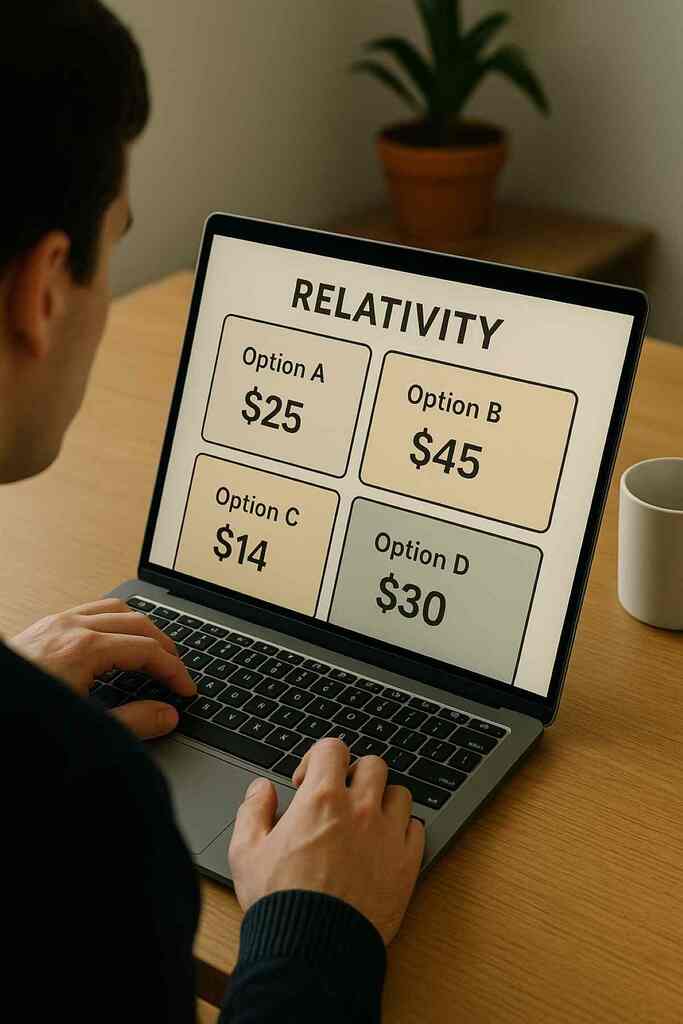
Using structured frameworks helps overcome the limitations of relative thinking
1. Create Objective Evaluation Criteria
To counter relativity’s distorting effects, establish concrete criteria before evaluating options. When house hunting, determine your non-negotiable requirements and maximum budget before viewing properties. This creates an objective framework that helps resist the influence of exceptionally attractive but unsuitable options.
2. Expand Your Reference Points
Deliberately seek diverse perspectives to avoid narrow comparisons. When considering a job offer, don’t just compare it to your current salary—research industry standards, factor in benefits, growth potential, and work-life balance. Broader reference points lead to more balanced judgments.

Expanding your reference points helps overcome the limitations of relative thinking
3. Recognize Deliberate Anchoring
Train yourself to identify when anchors are being strategically placed. When a salesperson shows you the most expensive option first, they’re establishing an anchor. Acknowledge this tactic and mentally reset your expectations before considering more reasonable alternatives.
4. Use Absolute Measures When Possible
Supplement relative comparisons with absolute metrics. When evaluating investments, don’t just compare returns—calculate the actual dollar amount you’ll receive and consider what that means for your financial goals. Absolute measures provide grounding when relative comparisons become misleading.
5. Implement Decision Journaling
Keep a record of important decisions, including the options considered, comparisons made, and reasoning behind your choice. Reviewing this journal helps identify patterns in how relativity influences your thinking and improves future decision-making.

A decision journal helps track how relativity influences your choices over time
Limitations of the Relativity Mental Model
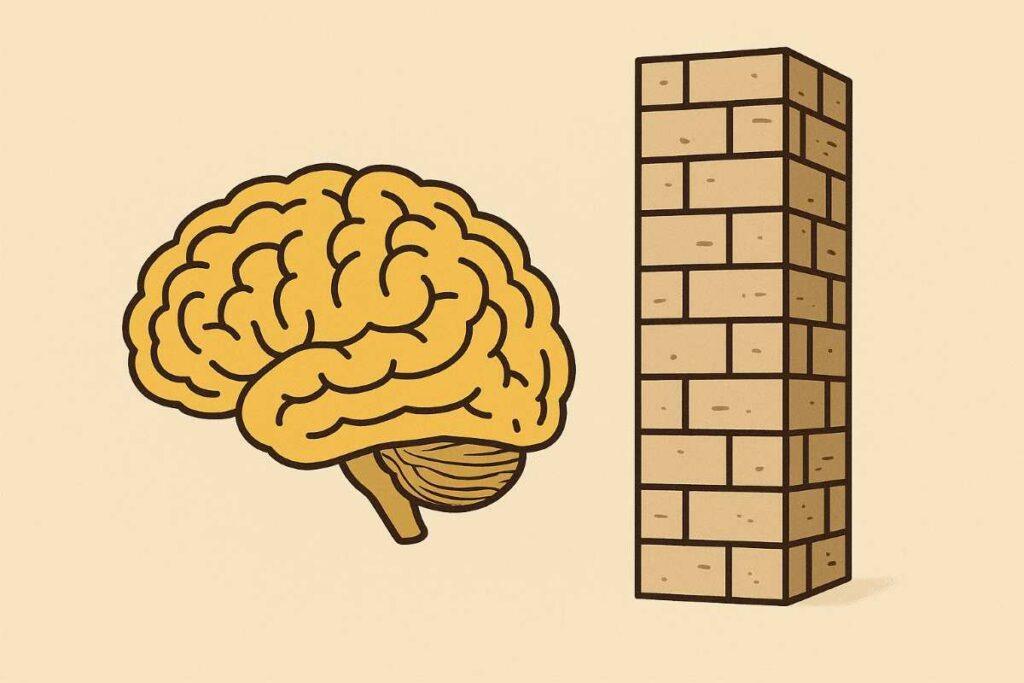
Understanding the limitations of relative thinking is crucial for balanced decision-making
While powerful, the relativity mental model has important limitations to consider:
- Ignores Intrinsic Value: Excessive focus on comparisons can blind us to the inherent worth of options. A job might be objectively terrible even if it’s better than your current position.
- Can Lead to Suboptimal Choices: Making decisions purely on relative terms might lead you to choose options that aren’t aligned with your true needs or values.
- Vulnerable to Manipulation: Understanding relativity makes it easier for others to influence your decisions through strategic framing and anchoring.
- Neglects Long-term Consequences: Short-term comparative advantages might overshadow more important long-term considerations.
The key to effectively using this mental model is recognizing when relative thinking serves you and when it leads you astray. Complement it with other mental models like first principles thinking, opportunity cost analysis, and inversion to create a more robust decision-making framework.
Conclusion: Mastering Relativity for Better Decisions

Awareness of relativity leads to more intentional and effective decision-making.
The relativity mental model explains why we sometimes make decisions that seem right at first but later go wrong. It shows how context affects what we see and think. This helps us notice the hidden forces that guide our choices.
Think about negotiating a salary, buying something, or looking back on relationships. This model helps you ask: “Am I thinking clearly, or relatively?” This awareness makes your decisions more thoughtful and less impulsive.
Relativity affects more than just marketing or money. It impacts almost every part of our lives.
The relativity mental model reveals a fundamental truth about human cognition: we think in comparisons rather than absolutes. This insight explains countless everyday phenomena—from why the middle option often seems most attractive to why happiness can be so fleeting despite material progress.
As you incorporate this mental model into your thinking toolkit, you’ll find yourself making decisions that better reflect your authentic values rather than the contextual frames that happen to surround you.
In a world designed to manipulate through relative positioning, this awareness becomes nothing short of a superpower.
Frequently Asked Questions About the Relativity Mental Model
How is Einstein’s theory of relativity connected to the mental model?
While Einstein’s theory deals with physics concepts like time, space, and motion being relative to the observer’s frame of reference, the relativity mental model applies this same principle to decision-making and perception. Both recognize that measurements and judgments depend on perspective rather than existing as absolute values.
How can I avoid being manipulated by others using the relativity principle?
Awareness is the first defense. When making important decisions, ask yourself: “Is this option attractive on its own merits, or only in comparison to something else?” Establish objective criteria before evaluating options, and be especially vigilant when presented with “anchors” or when options are framed in particular ways.
Can relativity be useful in negotiations?
Absolutely. Understanding relativity helps you recognize anchoring tactics and set effective anchors yourself. For example, making the first offer in a negotiation allows you to establish the reference point around which discussions will revolve. Similarly, presenting multiple options can frame the conversation in ways that benefit your position.
